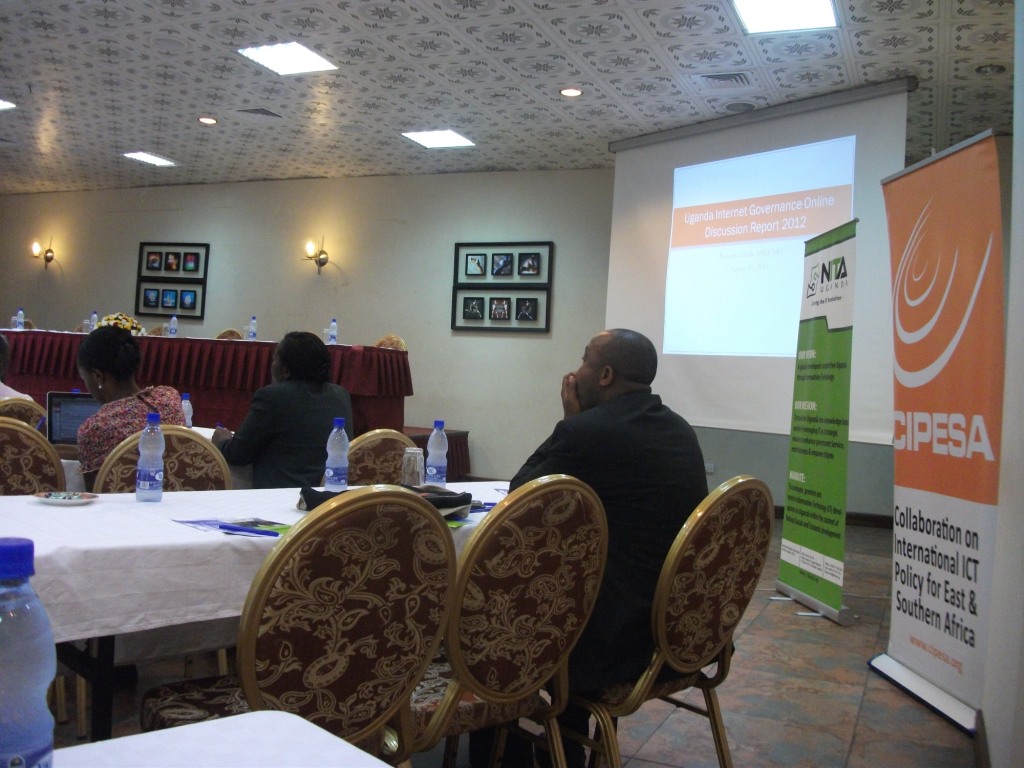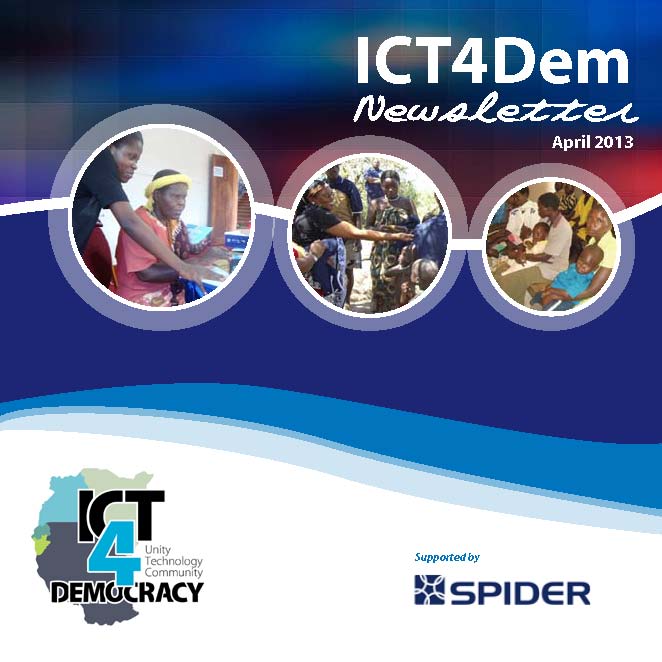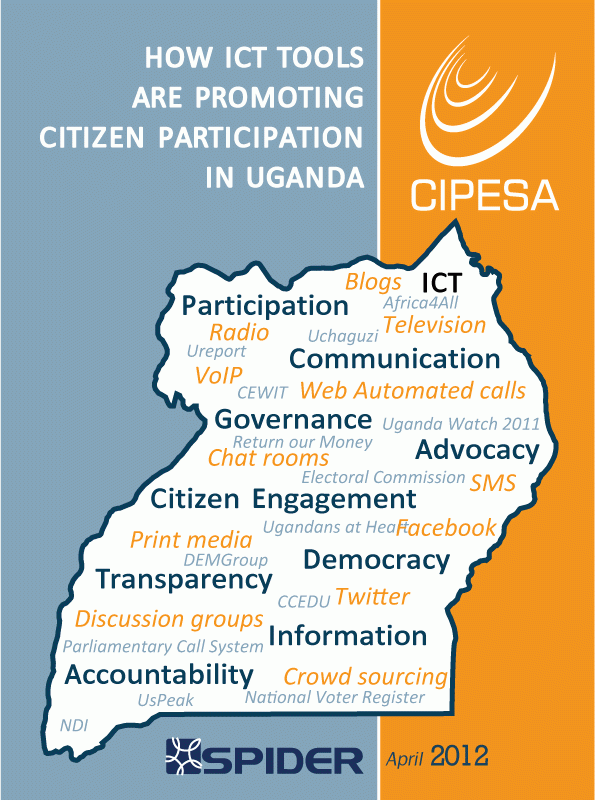Understanding precisely what role Information and Communication Technologies (ICTs) play in governance, and how, is very important to our work. Over the past 18 months, we have interacted with organizations at country, regional, and international levels that utilize and promote the use of ICTs in governance. These interactions have served as a learning opportunity for us, since the use of new technologies in governance processes in developing countries is not one with a long (recorded) history. But while these interactions have helped us to understand better how ICTs can have a good chance of delivering positive outcomes in –governance—and in many other areas—they have also helped us to share knowledge and resources with diverse actors.
And while our own understanding of the role of ICTs in service delivery, in encouraging participation, and in promoting governance is steadily changing, we have noticed that the way different stakeholders view this role differs rather widely. There are various facets to the matter. Some look at it from the access and affordability angle; others from the utility side (value and functions of ICTs). There are also cultural issues, which in some instances hinder the use of ICTs by women, and which many—particularly at the grassroots level – are eager to point out. A related one is the low level of literacy generally and in particular about using ICTs.
Not forgotten are social issues, such as who influences use of a technology in a community, or the use of technology for personal benefit versus use for community benefit. Here, from various interactions, it seems that where individuals will have direct, tangible, personal benefits from using a technology, they will be more likely to use it – which explains why in Uganda there are 8.9 million mobile money users, or ardent Facebookers, as well as thousands that read newspapers online, and many others that do online sports betting, but then the numbers for those engaging in online civic/ political actions remain low.
In many countries, ICTs are presenting a number of opportunities and alternatives in the delivery of services from both public and private sectors. The value delivered over these technologies is growing, especially in terms of efficiency and effectiveness. Because of these capabilities, the demand for transparency and accountability through the use of ICTs is increasing.
As part of its iParticipate Uganda project, CIPESA has conducted a series of citizen journalism trainings to empower communities in the use of ICT, especially social media, to report on governance issues. Based on a citizen journalism training manual we developed, CIPESA has equipped community members in three districts with skills for seeking and disseminating information related to reporting and monitoring of service delivery concerns. The trainings were conducted at grassroots-based partner centers, the Northern Uganda Media Club (NUMEC), Busoga Rural Open Source and Development Initiatives (BROSDI) and the e-resource center in Kasese.
These trainings also help to clarify what community workers understand about ICTs and governance, and what they see as possible areas where ICTs can promote governance. But beyond the trainings, many obstacles – sociocultural, political, and economic – stand in the way, and in our region there are few success cases that can be used to promote the uptake of ICTs in governance. And so we have realized, again, the need to promote access and awareness. We have also realized that government has a big role to play in this regard, itself being a champion of the use of ICTs, and having in place policies and practices that encourage citizens to use ICTs.
Additional difficulties include low awareness of the benefits of digital communications, high costs of accessing ICT tools, the low spread of access centers such as Internet cafes and telecenters, and misunderstandings about the intentions of initiatives that seek to hold leaders accountable and transparent. These are not minor problems. They are big problems, and they are well recognized by CIPESA itself, but even more so by our grassroots partners and the communities they serve. We have discussed some possible remedies – sensitization of citizens on the benefits of using ICT, trainings on the use of ICT for citizen reporting, lobbying leaders to become role models by adopting active use of ICT in their work – but all these take time and money. CIPESA will continue to advocate for use of ICT in enhancing citizen participation and also act as a center of expertise on the same.
The interactions and learning that we have done during 2011 and 2012 are a fulfillment of one of the objectives of iParticipate Uganda, namely network development among groups and institutions involved in the ICTs for citizen empowerment/ democracy work.
CIPESA has shared experiences and had the opportunity to voice collective concerns and advocate for the use of ICTs in governance not only at a regional level, but on the global stage too.
As we recognize the power of the Internet and its contributions to society, it is equally important to promote online safety, online freedoms and the free flow of information as well as freedom of expression. Research remains crucial in informing ICTs in governance interventions.
This article was published as part of the Swedish Program for ICTs in Developing Regions (Spider) Stories 2012. The full publication can be downloaded here.
ICT4Democracy in East Africa April 2013 Newsletter
In its April 2013 publication, the ICT4Democracy in East Africa Network – of which CIPESA is a member – highlights stories and experiences from the field.
Download the full publication here.
The network is premised on the recognition that Information and Communication Technology (ICT) enhances communication and the right to freedom of expression, as well as the right to seek, receive and impart information. In this respect, ICT has the potential to increase citizens’ participation in decision-making processes, thus strengthening democratisation.
Citizens' Perceptions on Open Government Data in Uganda
In addition to the study assessing Uganda’s Open Government Readiness, the Collaboration on International ICT Policy for East and Southern Africa (CIPESA) assessed citizens’ perceptions on open governance.
Based on a questionnaire, the study established that in Uganda there is a high level of knowledge about open governance, as well as great expectations of the benefits which Open Governance Data (OGD) would bring. Amongst the benefits mentioned were raising accountability by duty bearers, minimising corruption, promoting transparency, encouraging citizen participation in governance, monitoring service delivery, and aiding private sector innovation.
However, concerns were raised about the potential for misrepresentations and misinformation, increase in violent demonstrations as backlash from disgruntled citizens and increased administration costs associated with preparing data for open access. These fears need to be managed by both the state and by civil actors advocating open governance, in order to convince both citizens and government that OGD is for the good of the country.
The study made clear indications of what departments/ ministries should open up their data as a priority, and also identified various forms of data that citizens need to have greater access to. Moreover, the study has shown that the level of openness in government departments is severely low, even though there are laws that call for openness, and despite having clear examples of how increased openness results into public good. Government therefore needs to show greater political will to become more open, and this will need to be manifested in bold actions rather than simple declarations.
Whereas the results are not representative of Ugandan’s perceptions on open governance, they show a critical mass for demand and usage of open government data. The study establishes a key reference point which government should build on to roll out OGD, and which civil society can use in advocating and raising awareness about open governance in Uganda.
The study was conducted in the context of the Association for Progressive Communications (APC) Action Research Network, a project supported by the International Development Research Centre of Canada (IDRC).
Download the full report here.
See also assessment of open government data readiness in Uganda and Q&A with the research coordinator.
New Report Shows How ICT is Aiding Citizen Participation in Uganda
A new report by the Collaboration on International ICT Policy in East and Southern Africa (CIPESA) illustrates how Information and Communication Technologies (ICT) are aiding citizen participation in Uganda, but also points to the challenges that need to be overcome for these technologies to have a wider impact on governance.
The report reviews various ICT tools being used to promote transparency, accountability, and citizen participation in Uganda. It examines the utility and shortcomings of these tools, the challenges they face, and the factors contributing to their success. Furthermore, it offers suggestions for improving the utility, reach, and, hopefully, the success of initiatives that utilise ICT to improve citizen participation.Based on the 24 ICT tools assessed, seven main categories of uses of tools were identified: Information provision; Election monitoring; Lobbying and activism; Voter registration; Elections reporting; Citizen policing; and Civic participation in the post-election period.Innovations especially with mobile telephony and interactive mapping have showcased how ICT can help improve transparency and accountability in the delivery of public services. In the run up to Uganda’s 2011 general elections, ICT tools were used broadly, for campaigning, tallying results, monitoring the actions of political groups and the electoral body, for civic education, and for activism. The tools included mobile phones, automated calls, and crowd sourcing platforms, radio and television, as well as social media. They contributed to transparency of the polls – but probably not to voter turn-out.However, the most immediate challenge to the adoption of these tools is that few Ugandans are embracing them. In Uganda, market penetration for voice stands at 45% with a population coverage of close to 100%. Mobile accounts for more than 90% of new connections, with 910,000 new subscribers being added each year. While this is providing a solid base in terms of numbers of those who can use the ICT, the figures do not tell the whole story. For example, studies show that nearly half of mobile phone subscribers own at least two SIM cards. Moreover, even among the phone-owning class, for many usage beyond voice (and, well, Facebook and radio) remains limited.And there are yet more challenges. Limitations such as the cost of accessing and using the ICT, language barriers and low literacy levels mainly for the internet and mobile based platforms – as well as minimal attention by government to boosting usage of ICT in governance all hinder the effective use of these tools. This study finds that it is therefore crucial for organisations using ICT for participation and democracy to carry out extensive assessments before deploying the technology, to work with others rather than duplicate efforts, to create awareness and capacity among users, and to continuously assess the impacts the ICT initiatives are creating.This research was made possible by funding from the Swedish Program for ICT in Developing Regions (Spider), which is supporting projects in Kenya, Tanzania, and Uganda, in the areas of education, health, and governance. The results shall directly inform some wider actions in catalysing civic participation and democracy monitoring using ICT, which CIPESA and other SPIDER partners are undertaking in East Africa. Spider has provided seed-funding to a range of organisations that form the ICT4Democracy in East Africa Network (www.ict4democracy.org), who will benefit from this study.
Download the full report here
CIPESA Newsletter September 2011
In this issue of the newsletter, read about concerns that Tanzanian authorities are growing intolerant of online activity deemed critical of the government; the link between ICT and open government; how social media could promote democracy; the challenges of accessing public information in Uganda; the ICT-for Democracy in East Africa project; and the Uganda national internet governance Forum. More



